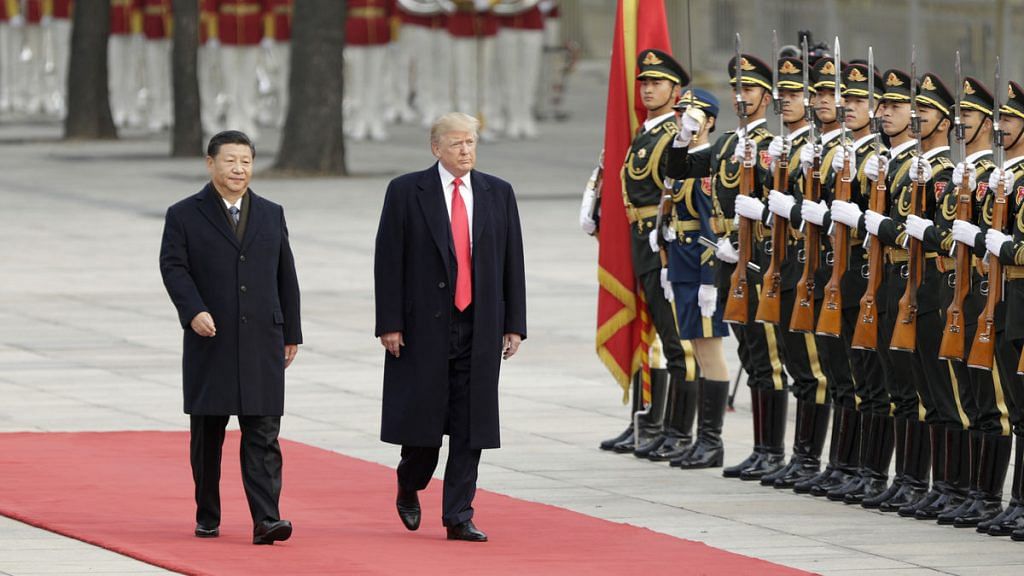As the number of people globally infected with the coronavirus crossed 700,000 and the count for dead touched 34,000 Monday afternoon, larger questions of how the world will look once the pandemic abates are already being asked.
Is China, said to have conquered the virus because no new deaths have been recently reported, going to overtake the US as the pre-eminent global power? Is US President Donald Trump’s injection of $2 trillion into the economy an assertion that it isn’t about to cede space to China? Will the European Union, amongst the hardest hit by the pandemic, survive in the present form?
And will Prime Minister Narendra Modi, whose outreach to South Asia has been perfunctory at best with one tele-conference, emerge as a regional leader in his own right?
As far as India is concerned, the answer is easy. India is far too overburdened with its own health challenges and the crisis facing its migrant labourers to be able to reach out to anyone right now. Although a defence medical team is in the Maldives to deal with coronavirus patients (there are 4 reported) and Bhutan has asked for protective gear.
Also read: Coronavirus makes America seem like a civilisation in decline
US changing stance
So, it’s back to the Big Two on the world stage – the US and China. And how they will use this crisis to leverage their own positions to remain on top of the political pile at home.
Interestingly, Donald Trump, who faces a re-election in eight months, has considerably piped down his rhetoric from two weeks ago when he described Covid-19 as the “China virus”.
Seems the US president is already at odds with his own Coronavirus Task Force, which remains obsessed with both statistics – by Monday, the US had crossed over 140,000 Covid-19 positive cases and over 2,400 deaths – and containment strategy.
But signs are that Trump is already softening his aggressive attack against Beijing because he doesn’t want China to backtrack on its trade deal commitments of buying agricultural produce from the US. According to CNN, Trump understands that the state of the US economy is critical to his own re-election and he is worried that China may renege on its promise to buy $80 billion worth of farm and seafood products.
Also read: Why Modi, Trump & others are angry at WHO’s handling of Covid-19 crisis
China’s diplomatic onslaught
Mark the contrast. Only last week, Trump refused to allow a G-7 response to the coronavirus pandemic, because the group did not agree to describe the virus as the “Wuhan virus.”
As for Xi Jinping, he is letting his bureaucrats do the talking. First to speak out was Chinese spokesperson Lijian Zhao who accused the US of bringing the virus to China during the military games in Wuhan in October 2019.
“It might be the US army who brought the epidemic to Wuhan. Be transparent! Make public your data! US owe us an explanation,” Zhao had tweeted on 12 March.
China’s ambassador to South Africa Lin Songtian also retaliated against Trump’s description of the “Chinese virus,” tweeting “When the flu broke out in the US, we never called it the ‘American Flu.’ Some US’ politicians blame game by calling it the ‘Chinese virus’ is groundless and unacceptable,” Lin said.
Also read: Covid-19 conspiracy theories and what China did wrong and what it didn’t
Beijing’s Covid-19 diplomacy
Beijing is using the crisis to expand its own influence abroad. Thousands of masks and testing kits have been donated to Pakistan and several countries in South-East Asia. Medical teams have been sent to Iran and Iraq and a $500 million loan has been extended to Sri Lanka.
China has also sent planeloads of medical supplies to Italy, terribly hit by the pandemic. Around the same time, the US was flying in half-a-million Italian-made diagnostic swabs, according to the British newspaper, The Guardian, to treat patients at home, while Trump “pressed South Korea” to send testing kits.
And in what could amount as the unkindest cut, Chinese media reported Sunday that the first planeload of medical supplies from China flew in to New York, the epicenter of the outbreak in the US, carrying 12 million gloves, 130,000 N95 masks, 1.70 million surgical masks, 50,000 gowns, 130,000 bottles of sanitisers and 36,000 thermometers.
Observers are already comparing the US’ response to the coronavirus with the 2014 Ebola outbreak in West Africa, when it sent not only medical teams and supplies, but also troops. In fact, only $1.15 billion or so out of Trump’s $2 trillion stimulus has been allocated for expenditure outside.
As for India, Modi’s celebrated friendship with Trump has evoked some interesting comments among Chinese mandarins. Its ambassador to India, Sun Weidong in several tweets last week described a conversation between external affairs minister S. Jaishankar and Chinese foreign minister Wang Yi and said India “agreed not to label” the virus as the “China virus”.
The ministry of external affairs chose to maintain a diplomatic silence on the tweets – a silence that spoke louder than words.
Views are personal.
